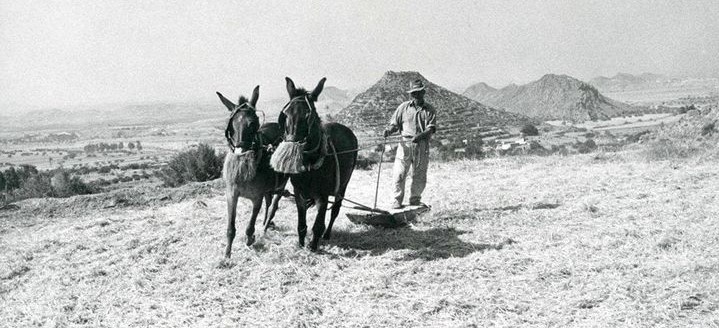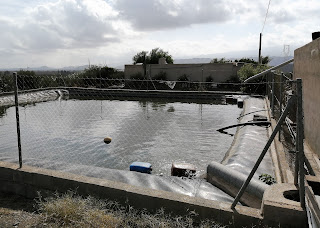 Every farm in southern Spain has something called an 'era'
which is a flat dirt circle, I think called a threshing circle in
English, where the hay would be put after being cut with a scythe. A
wooden board with rows of knife-like wheels underneath was pulled by a
donkey and driven with long-reins by the farmer. Weight must be applied
to the board in order to cut the hay, hence the children. There are
actually several different boards with different types of knifed wheels
for each phase of cutting. It was a very exciting time for the children
when the farmer called them to come and sit on the board while he went
round and round. It takes several days to cut the hay into small pieces
and release the grain from the stalk. It is a sticky job, in the heat
you get covered in pieces of hay and it is a bit like a ride at an
amusement park, bumping up and down it is a rough ride especially when
the hay is in the centre at the beginning, it gets to be a smoother ride
as the hay gets spread around the circle. The board sometimes even
flips over.
Every farm in southern Spain has something called an 'era'
which is a flat dirt circle, I think called a threshing circle in
English, where the hay would be put after being cut with a scythe. A
wooden board with rows of knife-like wheels underneath was pulled by a
donkey and driven with long-reins by the farmer. Weight must be applied
to the board in order to cut the hay, hence the children. There are
actually several different boards with different types of knifed wheels
for each phase of cutting. It was a very exciting time for the children
when the farmer called them to come and sit on the board while he went
round and round. It takes several days to cut the hay into small pieces
and release the grain from the stalk. It is a sticky job, in the heat
you get covered in pieces of hay and it is a bit like a ride at an
amusement park, bumping up and down it is a rough ride especially when
the hay is in the centre at the beginning, it gets to be a smoother ride
as the hay gets spread around the circle. The board sometimes even
flips over.
No harm is done because you just fall into a huge pile of hay. You
must watch your fingers though and can’t hold on to the board for risk
if being cut by one of the blades. When the threshing is done you must
wait for a windy day and with a naturally grown pitch-fork, you throw
the hay in the air. These pitch-forks grow on a tree in the shape of a
fork and after being whittled down a little make the perfect pitch-fork.
On the windy day, and after hours of repeating this procedure of
throwing the hay in the air, the cut hay is on one side of the era and
the grain on the other, it is quite ingenious really, each to be stored
and used throughout the year. I would like to have shown you a picture
of the pitch-forks but ours was lost. We have an era on our property and across the street is another era
that is shared by three houses: it is communal property and doesn’t
belong to any one of the houses but to all three. It is things like this
that make buying land in Spain difficult. For example a long time ago
your grandfather may have traded a donkey for the large algarrobo tree on the corner of his property, the donkey is long since dead but the tree on your land now belongs to someone else.
From Barbara Napier's Animo Stories here.
The two photos come from the same 'era' in the hills above Mojácar. The
first one dates from the 'fifties, the second one features our daughter
and was taken in the early 'eighties.

